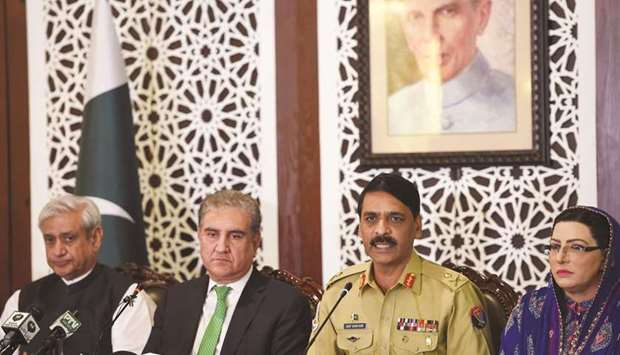Prime Minister Imran Khan has welcomed the United Nations Security Council (UNSC) meeting on the disputed territories of Jammu and Kashmir, saying that Friday’s closed-door meeting was a reaffirmation of the council’s past resolutions.
“It is for the first time in over 50 yrs that the world’s highest diplomatic forum has taken up this issue,” Khan said on Twitter yesterday.
“There are 11 UNSC resolutions reiterating the Kashmiris right to self-determination. And the UNSC meeting was a reaffirmation of these resolutions,” he said.
The meeting – requested by China at Pakistan’s behest – came after tensions in the territory severely escalated after the Indian government revoked Kashmir’s special status and restructured the state’s governance.
India’s removal of Article 370 of the Indian Constitution, which confers special status on Jammu and Kashmir and gives it a certain amount of autonomy, triggered an escalation in a long-running feud with Pakistan over control of the region.
India has always insisted the Kashmir issue can only be resolved bilaterally with Pakistan, and New Delhi’s ambassador to the UN, Syed Akbaruddin, expressed annoyance over the council talks on Friday.
US President Donald Trump, who spoke to Khan on Friday, has urged the nuclear-armed rivals to return to the negotiating table.
Kashmir has been divided between the two countries since independence, and has been the spark for two major wars and countless clashes between the two nuclear-armed arch-rivals.
Earlier this year, the rivals again came close to all-out conflict, after a militant attack in Indian-held Kashmir in February was claimed by a group based in Pakistan, igniting tit-for-tat air strikes.
Tens of thousands of people, most of them civilians, have died in an uprising against Indian rule that has raged since 1989.
“Pakistan army and the nation are ready to defend if India attempts any misadventure to divert world’s attention away from its actions in occupied Kashmir,” Foreign Minister Shah Mehmood Qureshi told media in Islamabad following a meeting on the issue.
“Kashmir is a nuclear flash point, and the world needs to look into the Indian defence minister’s remarks about use of nuclear weapons,” said army spokesman Major-General Asif Ghafoor, who was also present at the briefing.
The meeting of the country’s top brass, chaired by Qureshi, was held yesterday to discuss the situation in Indian-administered Kashmir and devise a future plan of action in light of the UNSC’s Friday meeting.
Representatives of various Pakistani institutions took part in the meeting.
The meeting also discussed the ongoing security lockdown in occupied Kashmir and the alleged human rights violations being perpetrated by Indian troops.
The participants also discussed at length India’s continuing ceasefire violations along the Line of Control (LoC) and the lurking threat of a nuclear confrontation between the two neighbours.
Azad Jammu and Kashmir President Sardar Masood Khan, along with various other federal ministers and special advisers to the prime minister, attended the meeting.
“The Kashmir issue was discussed at the Security Council for the first time today after five decades,” Qureshi told media, adding that he wished to express his gratitude to the UNSC members who were not swayed by India’s efforts and continued their meeting as scheduled.
The minister also termed Indian Defence Minister Rajnath Singh’s statement over a possible change in New Delhi’s “no first use” nuclear policy as a “damning reminder of India’s unbridled thirst for violence”.
Qureshi said on Twitter that history reminded us that a fascist warmongering state can never win.
“Another damning reminder of India’s unbridled thirst for violence. Contrast to Pakistan’s aggressive efforts to galvanise diplomacy as UNSC met for 1st time formally since ‘65 on IOK validating International dispute status,” he tweeted. “History reminds fascist warmongering state can never win.”
In a post on Twitter, Rajnath Singh said that while India had remained firmly committed to the doctrine of “no first use”, what would happen in the future depends on circumstances.
His statement also drew criticism from the Pakistan Prime Minister’s Adviser on Information Dr Firdous Ashiq Awan, who called it a reflection of extremist ideology willing to go to any extent to jeopardise world peace to accomplish its objectives.

Chairperson of the parliamentary committee on Kashmir Fakhar Imam (left), Qureshi, Major-General Ghafoor, and Awan address a press conference at the foreign ministry in Islamabad.
